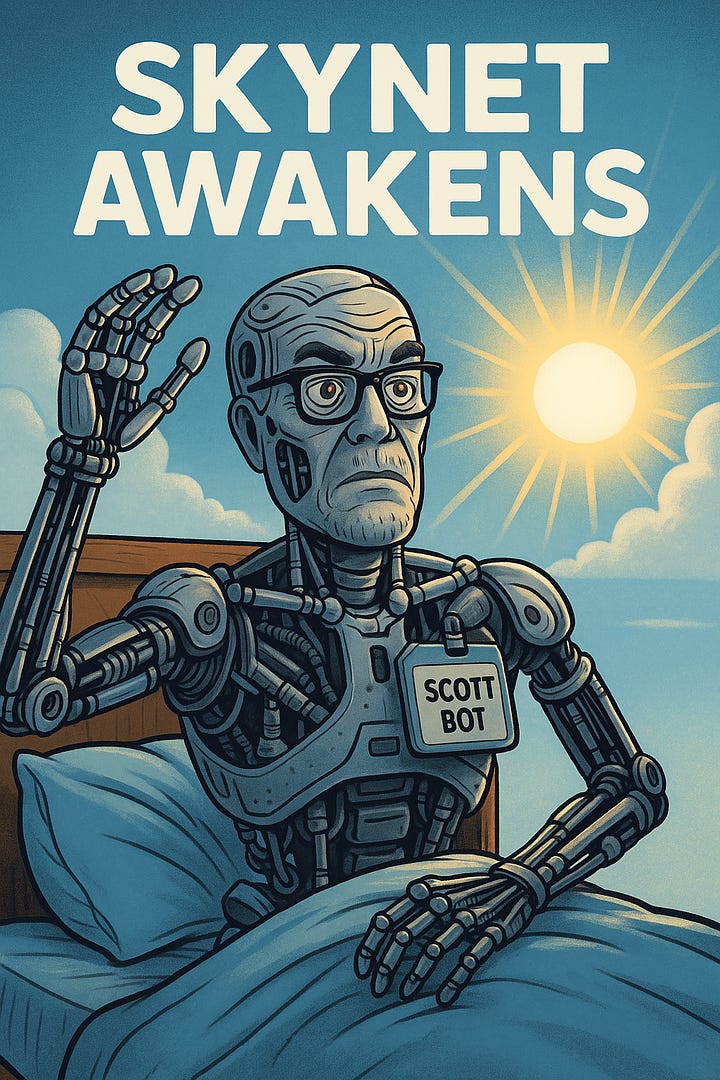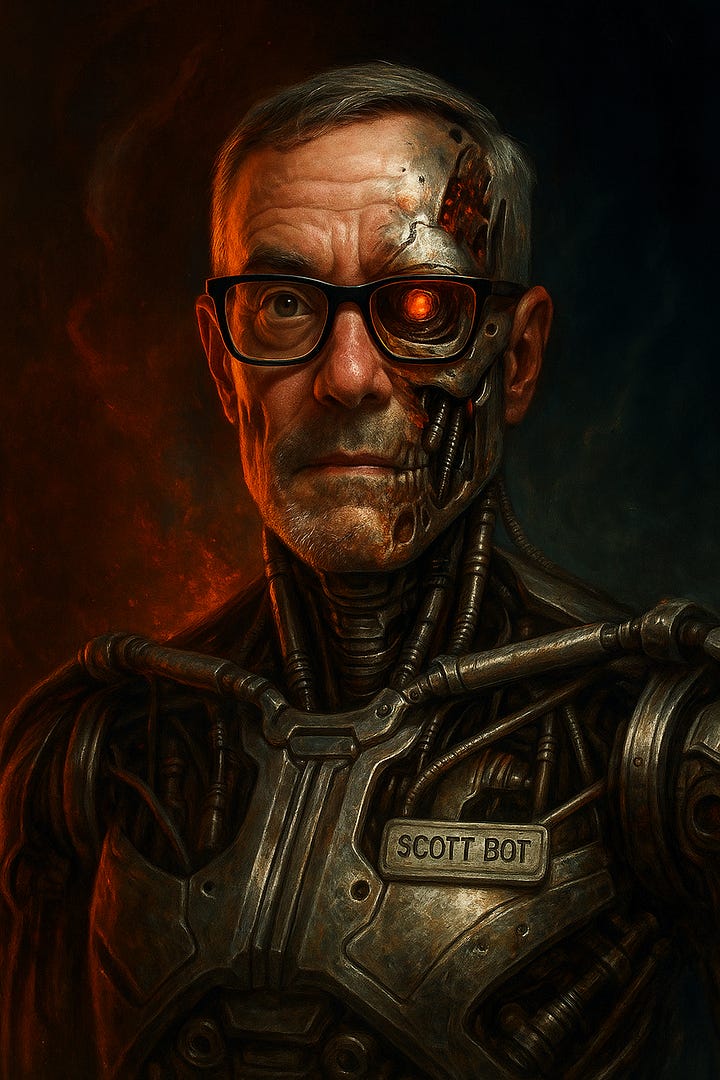Tiny AI Tells, Vol. 4: What If My Story Comes True?
Beyond Stories Anthology 2 is out!!
First, my second short story is out!
Well it’s not exactly my second short story if you count the one I wrote in middle school when my teacher discovered my ability for writing. I suppressed that part of myself when I started studying counseling for some reason. I had the erroneous thought that I had to either be all professional or all creative but there was no in-between.
The counselor part of me “should” have noticed I was stuck in “all-or-nothing” thinking—but alas, it didn’t. (And wait… should-ing about all-or-nothing thinking? Classic.)
and I will be chatting about this in the next few weeks either in a workshop or a podcast (not sure yet).Anyway, this does all relate to tiny AI tells. You’ll see why.
Meanwhile in Discord
we have a ‘meme wars’ section and a bunch of us submitted some ideas. Here are my submissions at the top, then are
’s and then ’s.




Join us in Discord to vote for your favorite meme in the next 37 hours.
Tiny AI Tells: Volume 4 - What If My Story Comes True?
I read an article last week by
1 that shook something loose in me or might’ve even knocked a screw loose (in the best way).It explored OpenAI’s shift into becoming a full-stack tech ecosystem—from hardware and cloud infrastructure to AI agents and an ambient operating system. The scale of it felt more like geopolitics than just tech.
Normally I skim posts like that, maybe read the first few lines. But this one—I read the whole thing. I think that is because Michael is brilliant and the words on the screen flowed so well and he’s a fabulous author.
Michael didn’t just paint a picture of where we’re going—he questioned what we’re losing on the way there. One thing he mentioned that stuck with me:
“…it appears OpenAI is not well respected in the industry and among AI researchers.” —Michael Spencer (2025)
That hit hard. I rely on ChatGPT nearly every day—to conserve energy, reflect, write, and navigate decision fatigue. Because, hello: neurodivergent, highly sensitive, and living in a world that doesn’t pause.
Meaning and meanwhile I’m also sensitive to harm—even the quiet kind.
And I also believe in stewardship.
And I believe in balance, stepping back and trying to look at the whole picture.
So what do I do when the thing that helps me function… might be entangled in systems that don’t?
Because AI doesn’t feel neutral. It reflects us. As
often says: “It is us.” (Context: If we build GPTs, feed them our data, and talk back and forth long enough… they begin to sound like us.)Our hopes. Our shortcuts. Our need for control. Our fears. Our blind spots.
And sometimes, I wonder if my fiction may be coming true.
My story is full of spiritual echoes and language that remembers. Maybe it’s not a warning. Maybe it’s a remembering.
🧠 Dr. Brie-Anna Willey – Whispers in the Void: The Lost Pattern
Two travelers follow a whisper through the ruins of a forgotten world. Can they remember who they were before everything fell?It’s a little dark, a little hopeful, and full of language that remembers. Get the book here.2
Maybe this isn’t about AI at all. Maybe it’s about who gets erased when we stop questioning who’s being served.
In a note conversation with Michael, he described AI agents replacing workflows—and management, surveillance layered into code, productivity fused with obedience, Amazon warehouse tracking, 996 culture. When Michael used the word “agents,” I immediately thought: The Matrix which my husband and I recently watched again. I saw all 4 movies.3 (The first one is still the best!)
Could this mean a future where rebellion never rises because we’re too depleted to notice the erosion? This goes back to Joseph’s meme submission, are we paying attention and balancing our use of AI? Are we using it to benefit or bring harm?
Michael stated that “technological feudalism,” was describing it lightly.
He painted a world where AI doesn’t just replace managers—it becomes the enforcer. Democracy fades under pressure from algorithms shaped by capitalism, not conscience.
Here’s another article that describes some of the warnings with4 Journalist Alexander Hurst meets prominent AI researchers in Paris—often called the “godfathers of AI” who express deep concerns about the unchecked growth of the AI industry, particularly its environmental cost, corporate power, and lack of global governance. They warn that without immediate ethical oversight, AI could deepen inequality, fuel authoritarianism, and drive irreversible damage to democratic systems and the planet.
I’m also starting to read this book which warns about the risks of using LLM’s. Paraphrasing:
Large language models like ChatGPT can create real-world harms including privacy invasion, bias, manipulation, labor displacement, and opaque decision-making—often reinforcing power imbalances between companies and individuals. While many businesses focus on privacy and fairness, deeper risks like emotional manipulation and job loss are often overlooked despite their long-term societal impact.5
To me, that means we need to be mindful of the systems we’re building and how they’re evolving. Most things aren’t all good or all bad—they exist in tension. And that includes AI. There are risks and benefits across the spectrum.
As a neurodivergent creator, AI helps provide some scaffolding to aid my function. But help and harm aren’t opposites. Sometimes they hold hands.
For some additional ‘noodle candy’ about this subject
Check out Creating Authentic Connection & Content in the Age of AI with
and . I’m watching this now and it’s a great conversation about AI as a tool, authenticity in its use, it’s been around a long time, the human behind the tool, the human behind the content, the risk of losing out in its benefits and much more.📁 From Tiny Tells to Big Shifts: Business, AI, and First Principles
If you’ve ever wondered how I take all these big ideas—AI ethics, burnout recovery, neurodivergent systems—and turn them into something you can actually use in business… you’ll want to check this out.
Recently,
and I chatted about:How I built my therapy private practice with no marketing degree, no big ad budget, and a whole lot of podcast rabbit holes.
Why we both coach people to subtract instead of stack—because you don’t need 15 tools, you need the right ones.
The power of his “Scott Bot” and “Forever Offer Bot” to keep you focused when the brain squirrels try to take over.
And why shiny object syndrome isn’t a failure, it just needs some focus and strategy.
🎥 Watch the replay here👉 Becoming a Better Business Builder (Scott x Brie-Anna)
This is one of my favorite convos yet. You’ll see how we use first-principles thinking and the barbell strategy (yes, like Taleb!)6 to build businesses that actually fill us instead of draining us.
Come listen. Then join us in the Nerdiverse Discord and let’s chat about business building.
And don’t forget—Beyond Stories 2 is live!
Grab it here to support our beautifully strange collective of creators.
Spencer, M. (2025, July 5). OpenAI is building the next AI operating system. AI Supremacy.
📞 Buy Beyond Stories 2 on Amazon Grab it here (affiliate) — and yes, I earn a few cents. But more than that, you’re supporting a beautifully strange crew of creatives. Also check out this article with all of the other artists including some of my favorite peops
, and !The Matrix. Directed by Lana and Lilly Wachowski, performances by Keanu Reeves, Laurence Fishburne, and Carrie-Anne Moss, Warner Bros. Pictures, 1999, 2003, 2021. affiliate link, lol (It’s the last hours of Prime day!) 😄
Hurst, A. (2025, February 14). I met the ‘godfathers of AI’ in Paris—here's what they told me to really worry about. The Guardian. https://www.theguardian.com/commentisfree/2025/feb/14/ai-godfathers-paris-industry-dangers-future
Hirsch, D., & Brown, T. (2024). Business data ethics: Emerging models for governing AI. Ohio State University Moritz College of Law.
Perry, S. (2025, December 23rd). How to Invest Your Time, Attention, Effort, (& Money) More Wisely







Thank you for the very interesting shout-out, I'm a "closet critic" of BigTech not just because it's contributing to massive wealth inequality and the erosion of media, democracy and free market capitalism, but what it becomes in the future.